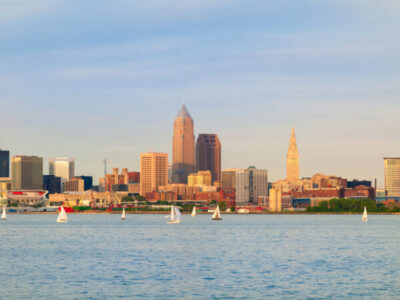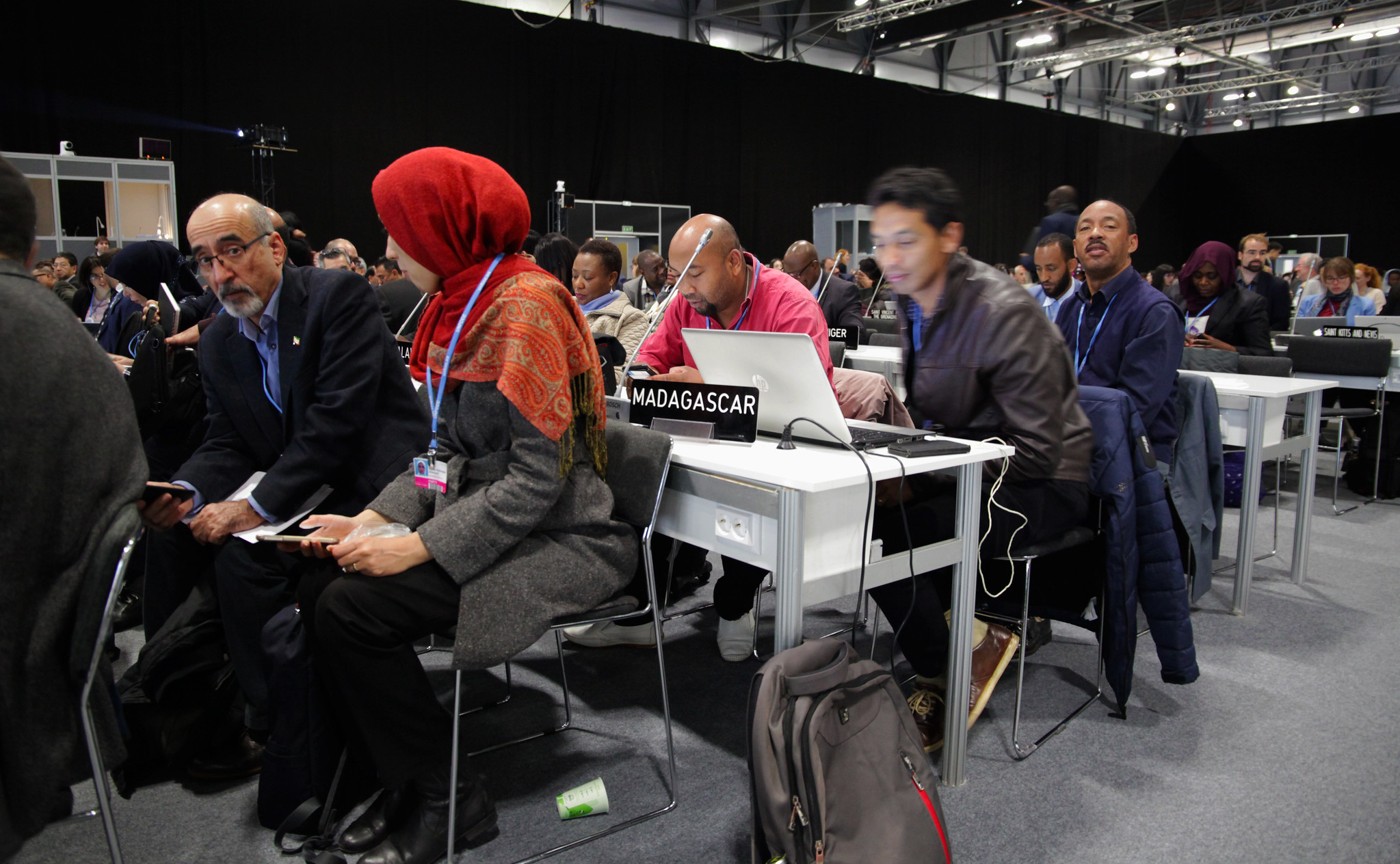
By Shelley Inglis, University of Dayton, The Conversation
![]() is an independent and nonprofit source of news, analysis and commentary from academic experts.
is an independent and nonprofit source of news, analysis and commentary from academic experts.
Over two weeks in November, world leaders and national negotiators will meet in Scotland to discuss what to do about climate change. It’s a complex process that can be hard to make sense of from the outside, but it’s how international law and institutions help solve problems that no single country can fix on its own.
I worked for the United Nations for several years as a law and policy adviser and have been involved in international negotiations. Here’s what’s happening behind closed doors and why people are concerned that COP26 might not meet its goals.
What is COP26?
In 1992, countries agreed to an international treaty called the United Nations Framework Convention on Climate Change (UNFCCC), which set ground rules and expectations for global cooperation on combating climate change. It was the first time the majority of nations formally recognized the need to control greenhouse gas emissions, which cause global warming that drives climate change.
That treaty has since been updated, including in 2015 when nations signed the Paris climate agreement. That agreement set the goal of limiting global warming to “well below” 2 degrees Celsius (3.6 F), and preferably to 1.5 C (2.7 F), to avoid catastrophic climate change.
COP26 stands for the 26th Conference of Parties to the UNFCCC. The “parties” are the 196 countries that ratified the treaty plus the European Union. The United Kingdom, partnering with Italy, is hosting COP26 in Glasgow, Scotland, from Oct. 31 through Nov. 12, 2021, after a one-year postponement due to the COVID-19 pandemic.
Why are world leaders so focused on climate change?
The U.N. Intergovernmental Panel on Climate Change’s latest report, released in August 2021, warns in its strongest terms yet that human activities have unequivocally warmed the planet, and that climate change is now widespread, rapid and intensifying.
The IPCC’s scientists explain how climate change has been fueling extreme weather events and flooding, severe heat waves and droughts, loss and extinction of species, and the melting of ice sheets and rising of sea levels. U.N. Secretary-General António Guterres called the report a “code red for humanity.”
Enough greenhouse gas emissions are already in the atmosphere, and they stay there long enough, that even under the most ambitious scenario of countries quickly reducing their emissions, the world will experience rising temperatures through at least mid-century.
However, there remains a narrow window of opportunity. If countries can cut global emissions to “net zero” by 2050, that could bring warming back to under 1.5 C in the second half of the 21st century. How to get closer to that course is what leaders and negotiators are discussing.
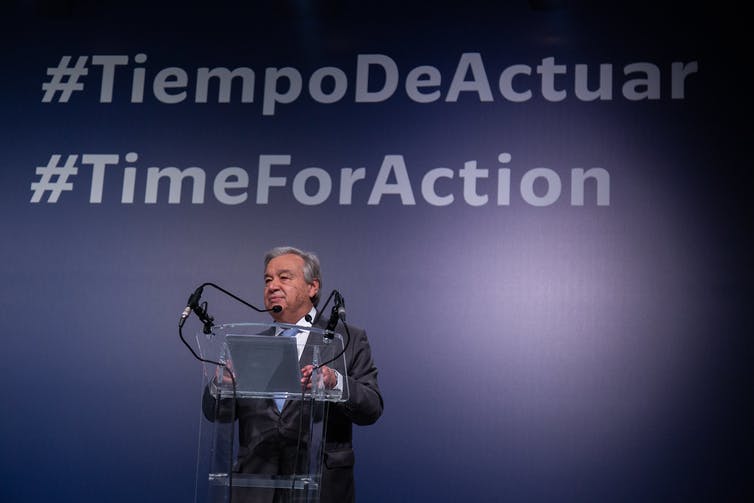
U.N. Secretary-General António Guterres called the latest climate science findings a ‘code red for humanity.’ UNFCCC
What happens at COP26?
During the first days of the conference, around 120 heads of state, like U.S. President Joe Biden, and their representatives will gather to demonstrate their political commitment to slowing climate change.
Once the heads of state depart, country delegations, often led by ministers of environment, engage in days of negotiations, events and exchanges to adopt their positions, make new pledges and join new initiatives. These interactions are based on months of prior discussions, policy papers and proposals prepared by groups of states, U.N. staff and other experts.
Nongovernmental organizations and business leaders also attend the conference, and COP26 has a public side with sessions focused on topics such as the impact of climate change on small island states, forests or agriculture, as well as exhibitions and other events.
The meeting ends with an outcome text that all countries agree to. Guterres publicly expressed disappointment with the COP25 outcome, and there are signs of trouble heading into COP26.
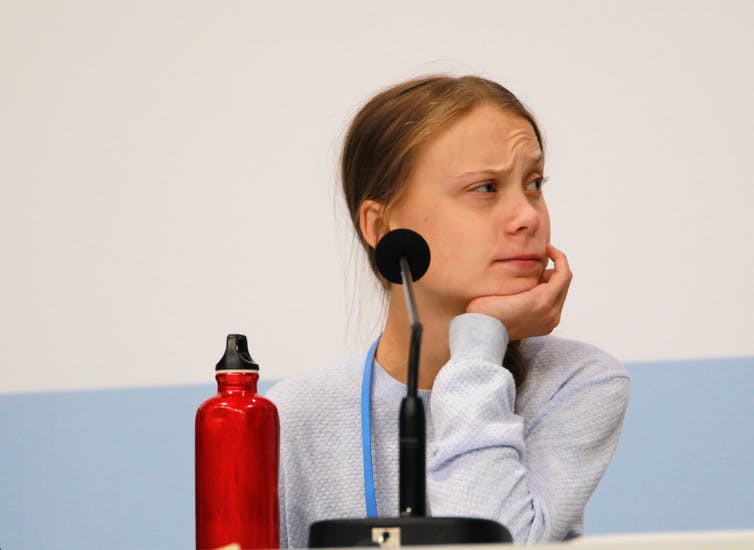
Celebrities like youth climate activist Greta Thunberg add public pressure on world leaders. UNFCCC
What is COP26 expected to accomplish?
Countries are required under the Paris Agreement to update their national climate action plans every five years, including at COP26. This year, they’re expected to have ambitious targets through 2030. These are known as nationally determined contributions, or NDCs.
The Paris Agreement requires countries to report their NDCs, but it allows them leeway in determining how they reduce their greenhouse gas emissions. The initial set of emission reduction targets in 2015 was far too weak to limit global warming to 1.5 degrees Celsius.
One key goal of COP26 is to ratchet up these targets to reach net zero carbon emissions by the middle of the century.
Another aim of COP26 is to increase climate finance to help poorer countries transition to clean energy and adapt to climate change. This is an important issue of justice for many developing countries whose people bear the largest burden from climate change but have contributed least to it. Wealthy countries promised in 2009 to contribute $100 billion a year by 2020 to help developing nations, a goal that has not been reached. The U.S., U.K. and EU, among the largest historic greenhouse emitters, are increasing their financial commitments, and banks, businesses, insurers and private investors are being asked to do more.
Other objectives include phasing out coal use and generating solutions that preserve, restore or regenerate natural carbon sinks, such as forests.
Another challenge that has derailed past COPs is agreeing on implementing a carbon trading system outlined in the Paris Agreement.
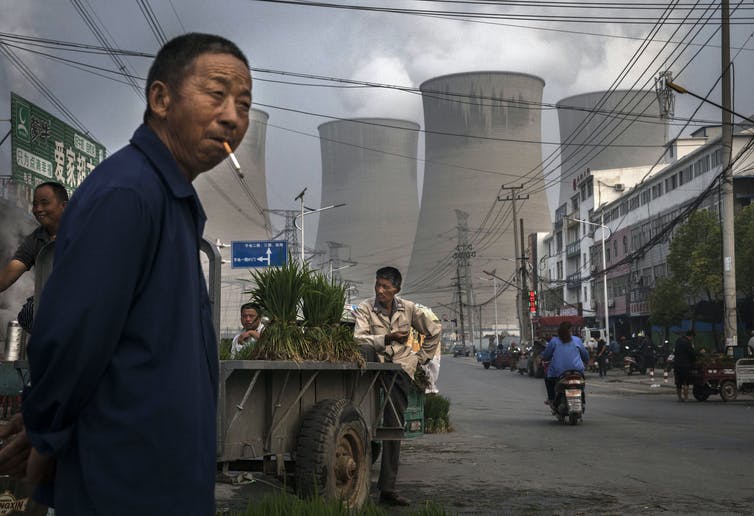
Chinese street vendors sell vegetables outside a state-owned coal-fired power plant in 2017. Kevin Frayer/Getty Images
Are countries on track to meet the international climate goals?
The U.N. warned in September 2021 that countries’ revised targets were too weak and would leave the world on pace to warm 2.7 C (4.9 F) by the end of the century. However, governments are also facing another challenge this fall that could affect how they respond: Energy supply shortages have left Europe and China with price spikes for natural gas, coal and oil.
China – the world’s largest emitter – has not yet submitted its NDC. Major fossil fuel producers such as Saudi Arabia, Russia and Australia seem unwilling to strengthen their commitments. India – a critical player as the second-largest consumer, producer and importer of coal globally – has also not yet committed.
Other developing nations such as Indonesia, Malaysia, South Africa and Mexico are important. So is Brazil, which, under Javier Bolsonaro’s watch, has increased deforestation of the Amazon – the world’s largest rainforest and crucial for biodiversity and removing carbon dioxide from the atmosphere.
What happens if COP26 doesn’t meet its goals?
Many insiders believe that COP26 won’t reach its goal of having strong enough commitments from countries to cut global greenhouse gas emissions 45% by 2030. That means the world won’t be on a smooth course for reaching net-zero emissions by 2050 and the goal of keeping warming under 1.5 C.
But organizers maintain that keeping warming under 1.5 C is still possible. Former Secretary of State John Kerry, who has been leading the U.S. negotiations, remains hopeful that enough countries will create momentum for others to strengthen their reduction targets by 2025.
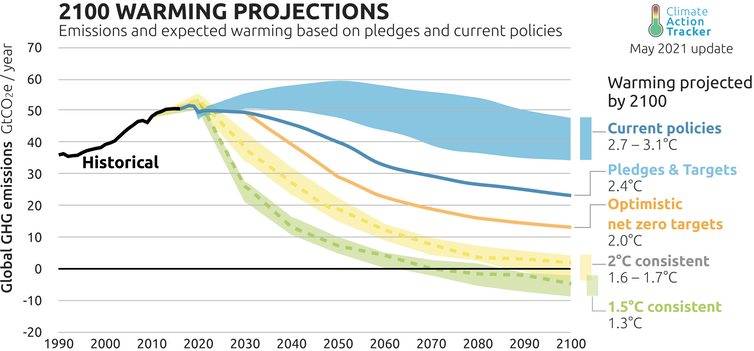
The world is not on track to meet the Paris goal. Climate Action Tracker
The cost of failure is astronomical. Studies have shown that the difference between 1.5 and 2 degrees Celsius can mean the submersion of small island states, the death of coral reefs, extreme heat waves, flooding and wildfires, and pervasive crop failure.
That translates into many premature deaths, more mass migration, major economic losses, large swaths of unlivable land and violent conflict over resources and food – what the U.N. secretary-general has called “a hellish future.”
Catch more news on Great Lakes Now:
COP26 Coverage: What do you want to know about the U.N. climate change conference?
U.N. Climate Conference: Michigan’s role at the U.N.’s COP26 and in the U.S.’s climate future
Featured image: U.N. climate summits bring together representatives of almost every country. UNFCCC
8 Comments
-
View your notifications
Edward H.C Graydon
6 hours ago
I find myself aligning with the basic understanding that is held by Bill Gates? That government and politicians are in fact inept and incapable of dealing with the issues of climate change based on the fact that it is not a peronally held inner position within themselves or a concern that is held with inner altruism .And because inner altruism on the subject is not being held within politicians it is up to those like Bill Gates and others to set the standards regarding climate change and or others to talk about the subject .It is next to impossible to solve the problem while the word embraces materialism .And because of this the world is in need of a singular world government that limits individual consumption .Personally, I think the ideology of socialism for the sake of the environmentally fragile planet should be experimented on the North American society first as they lack inner control on the issue of materialism. While others in poorer countries starve.
I am ok in principle with what the world elite are trying to achieve in regards too the planets woes with or without politicians who seem incapable of making hard choices. As I think regardless the rich are making the decision for them . « less
0
REPLY TO @EDWARD H.C GRAYDON:View your notifications
Edward H.C Graydon
5 hours ago
Reply to @Edward H.C Graydon: But I also believe?On many ideological issues held by Bill Gates and climate change many are in fact aligned to my own frame of thinking but I think the alignment between Bill Gates and Jeff Bezos makes this probomatic to some degree as most of the worlds side effects based on consumption and materialism stem from his friends business Amazon the same identity that contributes to the global plastics and waste from materialism found in the worlds oceans. So I guess the question is ? Does Bill Gates recognize the issue his friends conglomerate has on the planet as a whole.And is his friendship with Jeff Bezos the meaning of hypocrisy on the subject as I really don’t know ,but I see some reason for concern. « less
0
REPLY TO @EDWARD H.C GRAYDON: -
Edward HC Graydon said…
I wrote this in response to George Soros article on China!EDWARD H.C GRAYDON
Nov 4, 2021
Personally, Given my connections to China and the conversations I have had it is my opinion Trump was seen as the best possible option by the greater Chinese populous in regards personal freedoms. Trump was seen by the Chinese people as a liberator and it seemed as though at least by the Chinese citizen that Trump was doing it out of altruism for personal freedom.Trump argued in front of the world and quite adamently that China needed to level the playing field in as far as manufacturing ! And that manufacturing of all goods should return to the United States soil. It was a pretty good sales job to argue to the masses of voters in the United States at that time. as China was before that not really on the radar in such a pronounced way …
But Trump’s sales job perpetuated the idea of consumerism, only while doing so would have contributed to the destruction of the natural world only on United States soil. China is in a horrible position regarding the natural world ! It is very difficult on the environmental side of things to spend a great deal of time in China due to the side effects of the worlds weakness regarding Materialism .
If Trump was successful of having the world accept this as the new reality it would have only transferred the environmental nightmare back onto US soil.
The world underestimated China while greedily trying to take advantage of them financial regardless of the effects on the planet .And this has been going on for decades.
Read lessNOVEMBER 4, 2021 AT 5:40 AM
-
I wrote on Bill Gates personal site “Gates Notes” that censorship in my opinion was a leading concern that contributes to global warming and climate change but his site although fantastic is limited in the amount of text one can contribute .So although I have written my response as to the connection in my opinion. I will attach this article that claims the same.
In its new strategic plan, published in March, the Federal Emergency Management Agency (FEMA) describes 2017 as an “unprecedented year” of natural disasters. Photos of FEMA staff helping survivors of massive hurricanes in Texas, Florida, and Puerto Rico pepper the 38-page document, which notes that the average number of major disaster declarations per year has increased from 25 in the 1980s to nearly 90 per year since 2010. “Due to rising natural hazard risk,” the plan says, “the need for forward leaning [sic] action is greater than ever before.”
To an observant reader, these are clear references to climate change. Yet the document fails to directly mention, even once, the root cause of natural disasters’ growing intensity. (In comparison, the previous FEMA strategic plan weaves climate throughout its section on future risks.) This omission is just one of nearly 100 examples of global-warming-related censorship that have been compiled by the Silencing Climate Science Tracker, a database run by Columbia University’s Sabin Center law fellow Romany Webb, since December 2016.
“When you look at the tracker you see that the Trump administration has really undertaken a systematic attempt to silence science that doesn’t support its policies,” Webb says—namely, fossil fuel expansion. Websites focused on climate change have been deleted or rewritten. The word “climate” has been erased from program titles. Climate scientists have been prohibited from attending conferences or otherwise speaking publicly about their work. And scientific advisory boards have been disbanded. So far, Webb has documented evidence of censorship at the White House, NASA, the National Science Foundation, and nine federal agencies, including the Environmental Protection Agency.
In some cases, the purge appears to have been ordered by senior leadership; in others, scientists censor themselves to avoid attention or consequences. “The chilling effect that this administration has on the federal agencies—my clients, I’ve never seen them so afraid,” says Kyla Bennett, who represents government whistleblowers for Public Employees for Environmental Responsibility, a legal nonprofit.
To Bennett, the motive is clear: “The more you remove [climate change] from public documents and the public eye, the less inclination there is for people to worry about it and want to do something about it.” Pretending the problem doesn’t exist also permits agencies to ignore it in policymaking. For example, in the months before the EPA announced its repeal of the Obama administration’s central carbon pollution-reduction policy in October 2017, references to climate change were wiped from many of its websites and climate scientists were reassigned to new departments. “In the absence of climate change, you don’t need something like the Clean Power Plan,” Bennett says.
However, climate denial hasn’t stopped agencies from addressing present impacts. In fact, only two days after the FEMA strategic plan was published, the agency approved a $1.7 million grant to relocate Alaskan climate refugees, who are losing their homes as melting sea ice, thawing permafrost, and rising sea levels combine to erode coastlines.
Birds Tell Us to Act on Climate
Pledge to stand with Audubon to call on elected officials to listen to science and work towards climate solutions.
Sign the Pledge
Rufous Hummingbird. Rufous Hummingbird. Walter Nussbaumer/Audubon Photography Awards
“They’re willing to start addressing the effects because they are becoming so severe and so pressing,” Webb says. “But they really don’t want to admit the underlying cause of them and take steps to address it.”It’s not only direct climate action that’s corrupted by censorship, but also all sorts of everyday government decisions. Where we build roads and housing, how we invest public health resources, and which natural areas we protect today will determine our ability to adapt in coming decades, says Sarah Greenberger, Audubon’s senior vice president for conservation policy. “Climate change has to be a part of those decisions,” she says. “If we’re not doing that, it puts all of us and all of our interests at risk.”
The ultimate effect of this censorship is to suppress scientific information and research when we need it most. “Climate change is probably the biggest environmental issue facing us right now, and people will die. People are dying,” Bennett says. “The only thing that’s going to help us out of this is science and political guts.” For decades, we’ve been strong on science and short on guts. If we can’t even name the threat, we’ll soon find ourselves strapped for both.
-
Edward H C Graydon
I wrote this in Mandarin on Epoch Times news site and it still remains visable in Chinese although the Canadian sites like CBC have deemed it none presentable to the Canadian public.Lets talk censorship ?
View your notifications
Edward H.C Graydon
2 days ago
CONTENT DEACTIVATED It is in my opinion that the unvaccinated at this time in history should be congratulated as being heroes to the cause of climate change” .As it is those that have decided not to capitulate to public pressure, that now seem to be real hero’s, as they have reduced their carbon footprint by reducing all modes of fossil fuel use, unless of course they have their own car ?
They are what is called “real action” towards the cause of climate change, they are in fact modern day saints to the cause . They truly have taken action in reducing their carbon foot !
I think the only people now that can really call themselves climate activists are in fact the unvaccinated . As they have reduced all fossil fuel use by way of personal choice while the vaccinated are the leading cause of global warming.
-
COMMENTING IS NOW CLOSED FOR THIS STORY.
View your notifications
Edward H.C Graydon
1 day ago
Who cares?
4RS follow
Ricky Springer
1 day ago
Reply to @Edward H.C Graydon: Non self indulged people who think of others ahead of themselves.
8View your notifications
Edward H.C Graydon
1 day ago
CONTENT DEACTIVATED Reply to @Ricky Springer: Edward HC Graydon
December 21, 2021 at 8:46 am
All ready posted to Gates Notes !
Edward HC Graydon21 minutes ago
I know that this comparison is not what most people want to have associated with being fully vaccinated but it does seem as though the fully vaccinated are in fact carrying on the status quo with regard’s to climate change and the burning of fossil fuel use.Would the world be a better place to live if we banned all travel or is it better to be vaccinated and carry on the norm? Was it out of selfish ignorance that people vaccinated ? Was it fear of not being able to travel that mass amounts of Americans decided to vaccinate and was this a form of misguided priorities regarding fossil fuel use . Does being fully vaccinated allow for this to carry on with impunity or is it that those that have not been vaccinated equated the connection between the cause of climate change.
Is there a connection between moral superiority regarding the unvaccinated and climate change ,or is this question to far fetched !
Are the vaccinated moral corrupt concerning the issue of climate change and unwilling to go without for the sake of a better climate?
-
It seems that China will have its way with regards to Taiwan And the question should now be?Should Taiwan capitulate to China for the betterment of the planet as a whole and by not capitulating are they standing in the way of progress concerning climate change? I suppose the governments need to consider the trade offs.
U.S. climate envoy John Kerry spent much of 2021 trying to convince leaders in Beijing to reduce emissions, but they won’t even slow down their construction of new coal plants. Chinese officials have also made clear that any concessions on climate will require U.S. concessions on Chinese priorities such as Taiwan, trade policy and human rights.
-
“I said: ‘If you think that Americans and others will continue to invest in China based on your violating the sanctions that have been imposed on Russia, I think you’re making a gigantic mistake. But that’s your decision to make,’” said the US leader.
They have no other option as the world cannot afford to transfer the side effects of global materialism back on to American soil. The damage and pretence has been set and it seems futile to make such statements . Reduction in materialism by way of inflation and awareness either by force ,by way of government intervention seems the only answer as humans lack the inner ability to apply what is needed due to human weakness and an inability to apply delayed gratification.
-
I think society as a whole would be detrimentaly affected by transferring manufacturing back on to American soil. The duplication and transference is not plausible because the damage has already taken place leaving China a really hard place to live from the environmental side .I found China exsausting in that way, as no environmental regulations exist in any real way .The violations to the understanding of common sense in China seem quite hard to exsplain as it is all encompassing to a great extent.
I don’t think bringing back manufacturing in any real way is a positive for the environment of North America as it is only a transference and not a solution to the issues of climate change and preservation of the natural environment
I don’t think the United States should make the argument to the American public to bring it back in any real way as the problem will be, to what end?


